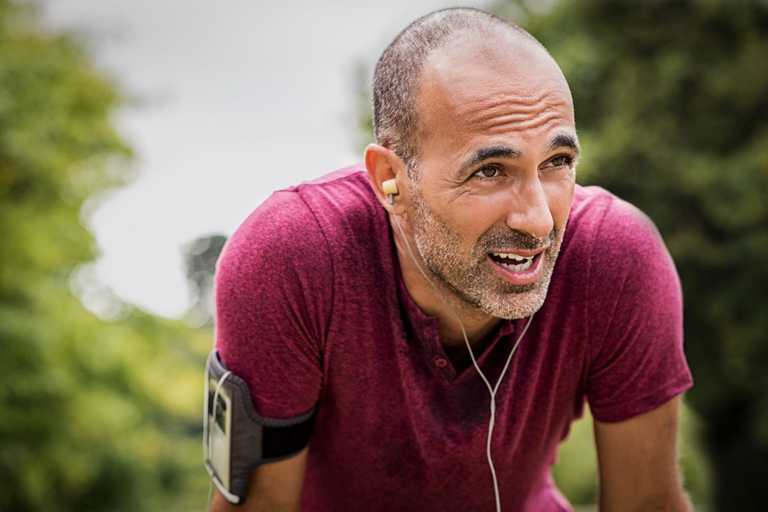
3T MRI for prostate
If you’re over 50 it’s important to check your prostate. At Prime Health we've developed a fast, accurate and ...

In today’s society, more and more of us are becoming aware of taking control of our own health. As we live longer, we want to live more and being in good health will help us live our lives to the fullest.
For men, particularly those aged over 50, prostate problems are common. Being aware of how you can improve your prostate health can be advantageous and may reduce your risk of developing prostate problems, including prostate cancer, in later life.
There is evidence that suggests that you can naturally strengthen your prostate health by adopting a healthy lifestyle. Lifestyle factors which may help support a healthy prostate include maintaining a healthy weight, eating a wide and varied diet, avoiding excessive alcohol and processed foods, and regularly exercising.
If you are in poor health, research suggests you may be at increased risk of developing prostate cancer or other prostate diseases.
Early warning signs of poor prostate health may include:
Such symptoms may be due to benign prostate hyperplasia (an enlarged or swollen prostate) and tend to affect men over the age of 50. Men who experience such symptoms should visit their GP promptly for testing.
Your GP may want to run tests such as a PSA (Prostate Specific Antigen) test or carry out an examination to check for conditions such as an enlarged prostate, prostatitis or prostate cancer. If the results of the tests indicate any red flags, your GP may refer you for a prostate biopsy or an MRI scan.
Disclaimer: Always seek the guidance of a qualified health professional with any questions or concerns you may have regarding your health or a medical condition. Content in this article should never be used as a substitute for direct medical advice from your doctor or another qualified clinician.
At Prime Health we believe prevention is better than cure, and actively encourage our patients to adopt a healthy lifestyle early on so that they can reap the benefits it will offer long into their older years.
For men, there are many lifestyle factors which can help them maintain a healthy prostate. Here we share our advice on what lifestyle changes you can adopt to help support good prostate health.
Living a healthy life is proven to be beneficial to both your physical and emotional health. It can help reduce your risk of developing prostate cancer, other cancers or other chronic diseases as you age.
If you are looking to keep your prostate healthy you may want to consider the following:
Taking control of your general health, will support your prostate health and give you more control as it will reduce your risk factor of serious disease and boost your immune system.

Whilst there have been some studies to show the positive outcome of eating and drinking certain foods and drinks to help reduce your risk of prostate cancer and maintain a healthy prostate, there have been an equal number of studies which throw such claims into doubt.
As opposed to focusing on specific food types or groups, a healthy, varied and balanced diet will help support a healthy body and promote prostate health.
If you want to eat a balanced and healthy diet rich in vitamins and minerals, you may want to consider the following nutritional advice:
There is a number of studies that claim there are certain foods and drinks which can help reduce your risk of prostate cancer or symptoms of an enlarged prostate. These studies include:
Lycopene is a powerful antioxidant that is thought to help protect cells from damage. It is a type of organic red pigment called a carotenoid and can be found in tomatoes and red or pink fruit and vegetables.
Lycopene has many health benefits, which include lowering the risk of certain cancers, offering natural sun protection and improving heart health. Research carried out in 2019 by the University of Sheffield also found that the powerful compound can also boost sperm quality.
Foods which are rich in lycopene include tomatoes and red or pink fruit and veg (eg: carrots, watermelons, strawberries cherries or papayas). Cooked and processed tomatoes contain the highest amount of lycopene, so eating ketchup and tomato sauce-based recipes is a good way to boost your lycopene intake.
Although it is considered more effective when consumed through food, lycopene can be taken as a supplement.

While many health professionals would recommend and encourage you to get the majority of vitamins and minerals from food, taking dietary supplements can be an effective way to support prostate health.
Supplements you may want to consider taking for better prostate health are lycopene, Omega 3 Fatty Acids (Fish Oil), Saw Palmetto, Vitamin E, Vitamin D, Pumpkin Seeds and Zinc.
Regular exercise is good for your heart and general health and it may also benefit your prostate health. Just 30 minutes of aerobic exercise a day such as walking, running or swimming may promote a healthier prostate.
Strength training is also seen as beneficial to maintaining good health and controlling your weight.
Kegel squeezes aren’t just for women! Research suggests that when men do regular Kegel exercises they too can strengthen and train their pelvic floor muscles to help control urination and urinary flow, both symptoms of an enlarged prostate.
Generally looking after your health offers many physical, social and emotional benefits. A healthy body can help you enjoy life to its fullest, and prioritising your health as you age can also help reduce your risk of chronic diseases including cancer and heart disease in later life.
To book your MRI scan today with Prime Health – Click here
If you’re over 50 it’s important to check your prostate. At Prime Health we've developed a fast, accurate and ...
A Prime Health personalised health check, will give you the information, advice and support you need to help y...
The highly experienced private GPs at Prime Health are here to keep you healthy. In a fast-moving world, they ...
We’ve developed a streamlined, fast-track pathway which utilises our years of experience and expertise in accurately and effectively assessing prostate symptoms.
Don’t wait for a prostate assessment. Wait less, worry less.


